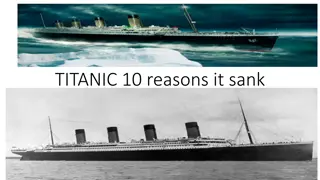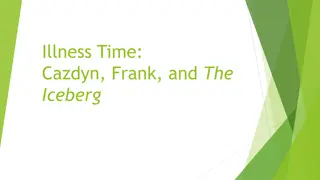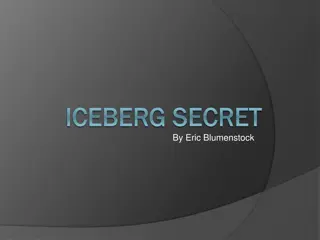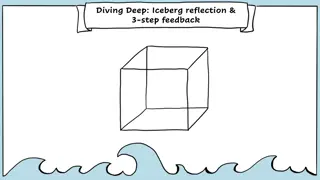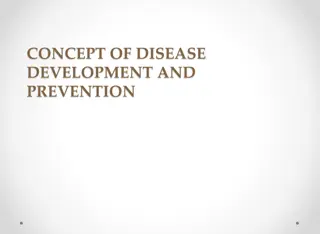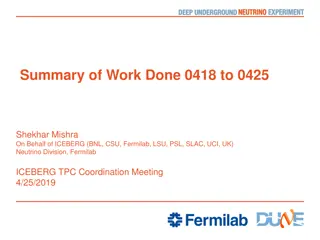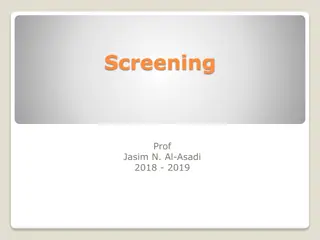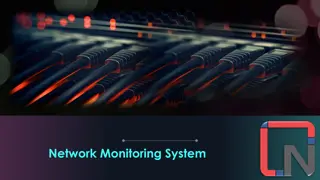Ginzburg Landau phenomenological Theory
The Ginzburg-Landau phenomenological theory explains superconductivity and superfluidity as distinct thermodynamic phases. It focuses on phase transitions characterized by singularities in specific heat at the transition temperature. Derived from BCS theory, it quantifies condensation energy, emphas
1 views • 38 slides
Crystal Field Theory in Transition Metal Complexes
Crystal Field Theory (CFT) explains the colors and magnetic properties of transition metal complexes. It focuses on the energy changes in d-orbitals of metal ions caused by surrounding ligands. This theory, developed in 1929, provides insights into the bonding interactions in complex compounds. The
10 views • 44 slides
Understanding Social Learning Theory and the Power of Example
Social Learning Theory, introduced by Bandura, emphasizes learning through observation and modeling. It explores how individuals acquire behavioral dispositions, trial-and-error experiences, and the impact of stimuli in the environment. The theory focuses on the importance of attention, retention, a
1 views • 17 slides
Evolution of Mathematical Theories and Proof Systems
Development of mathematical theories such as model theory, proof theory, set theory, recursion theory, and computational complexity is discussed, starting from historical perspectives with Dedekind and Peano to Godel's theorems, recursion theory's golden age in the 1930s, and advancements in proof t
1 views • 29 slides
Introduction to Organizational Behavior: Management Theories and Practices
Explore the evolution of organizational behavior from early management theories to contemporary practices. Understand the historical foundations and relevance of management theory in shaping workplace dynamics. Delve into key concepts like Scientific Management, Administrative Management, Bureaucrat
1 views • 28 slides
Theories on the Origin of State: Divine, Force, Patriarchal, and More
Various theories such as Divine Origin, Force Theory, Patriarchal Theory, and others explain the origin of the state. Divine theories attribute state creation to God, while Force Theory emphasizes the strong subjugating the weak to establish authority. Each theory offers unique perspectives on the h
1 views • 24 slides
Understanding Forgetting: Theories and Influence on Memory Recall
Forgetting is a complex phenomenon influenced by theories such as Decay Theory, Interference Theory, and Motivated Forgetting. The Ebbinghaus forgetting curve highlights how memories fade over time. Decay Theory suggests memories decay over time, while Interference Theory explains how old and new me
0 views • 25 slides
Psychological Theories of Criminality: Understanding the Roots
Psychological theories of criminality delve into the association between intelligence, personality, learning, and criminal behavior. Major theories include Psychodynamic Theory by Freud, Behavioral Theory by Bandura, and Cognitive Theory by Kohlberg. These theories explore how unconscious mental pro
1 views • 20 slides
Austin's Theory of Law by Rinkey Sharma: An Overview
Austin's Theory of Law, presented by Rinkey Sharma, delves into the Imperative Theory of Law as proposed by Austin, known as the father of English jurisprudence. It explores General and Particular Jurisprudence, Austin's definition of law, and the elements of positive law, emphasizing the concepts o
0 views • 11 slides
Theories of International Relations Overview
The field of International Relations (IR) encompasses various theories that seek to explain global phenomena, drawing from disciplines like history, philosophy, and economics. Theory, derived from contemplation and speculation, organizes ideas to explain issues such as state emergence, conflict caus
1 views • 47 slides
Understanding the Theory of Firms: Neoclassical vs. Modern Approaches
The theory of firms is explored through the Neoclassical and Modern perspectives. Neoclassical theory focuses on profit maximization, while Modern theory delves into managerial, principal-agent, and transaction cost theories. The discussion covers criticisms of Neoclassical theory and the essential
1 views • 79 slides
Insights into the Sinking of the Titanic: 10 Reasons Unveiled
Uncover the captivating tale behind the Titanic's tragic fate as we delve into 10 compelling reasons, from its construction in Belfast to the ill-fated encounter with an iceberg. Learn about the delay, the daring Captain Edward John Smith, optical illusions, fires onboard, and more intriguing detail
0 views • 10 slides
Understanding Culture: An Exploration by Kimberly Connelly
Kimberly Connelly, an experienced international officer, presents insights into culture through her personal journey and the Iceberg Metaphor of Culture. She discusses Edward T. Hall's Cultural Iceberg Model, highlighting the hidden aspects of culture and the importance of actively engaging with dif
0 views • 29 slides
Theories of Causation in Psychological and Social Sciences
Overview of theories of causation categorized into psychological, social psychological, and sociological perspectives. Psychological theories focus on instinctive, biological, and psychological qualities of abusers, including Attachment Theory, Psychodynamic Theory, Social Learning Theory, and Situa
0 views • 15 slides
Understanding Political Theory through a Contextual Approach
Exploring G.H. Sabine's perspective on political theory through a contextual approach, emphasizing the importance of historical context and societal influences. Sabine argues that while political theory evolves with its contemporary politics, it should be analyzed within its specific time and social
0 views • 9 slides
Evolution of Light Theory: From Wave Theory to Quantum Theory
At the turn of the century, the discovery of the photoelectric effect challenged the wave theory of light, leading to the development of the quantum theory by Max Planck and Albert Einstein. This new theory introduced the concept of discrete energy units known as quanta, bridging the gap between wav
1 views • 62 slides
Dp-branes, NS5-branes, U-duality, and M-Theory Overview
Overview of Dp-branes, NS5-branes, and U-duality derived from nonabelian (2,0) theory with Lie 3-algebra. Introduction to M-theory, including M2-branes and M5-branes in the strong coupling limit. Discussion on BLG theory, Lorentzian Lie 3-algebra, and the ABJM theory for M2-branes.
1 views • 32 slides
Reflections on Time, Life, and Death in "The Iceberg" and "Living in Prognosis
The texts explore the intertwining themes of time, life, and death through personal narratives and critical analysis. "The Iceberg" delves into the urgency of facing the future, while "Living in Prognosis" challenges traditional views on time and mortality, presenting a poignant reflection on the im
2 views • 6 slides
Explore the Titanic: Event, Movie, and Research Project
The content provided includes information related to the Titanic, such as a poster about a movie based on the event, a quick write task on the Titanic, the usage of AVID strategies for independent research, and a training plan for researching a person related to the Titanic incident. It also touches
0 views • 9 slides
Understanding Time-Independent Perturbation Theory in Quantum Mechanics
Perturbation theory is a powerful tool in solving complex physical and mathematical problems approximately by adjusting solutions from a related problem with known solutions. This theory allows for more accurate approximate solutions by treating the difference as a small perturbation. An example inv
0 views • 19 slides
Reflections on Illness and Time: Crisis, Transformation, and Liberation
Reflections on the complexities of time in the context of illness and crisis are brought forth in the readings of Cazdyn, Frank, and The Iceberg. The narratives delve into the stretching of time during crises, the interplay between chronic time and the threat of relapse, and the ever-present nature
0 views • 14 slides
Ethical Theories: Divine Command vs. Virtue Theory Explained
Divine Command Theory asserts that morality is derived from God's commands, contrasting with Virtue Theory which focuses on developing moral virtues to achieve human flourishing and excellence. Divine Command Theory relies on religious texts, while Virtue Theory emphasizes the cultivation of virtues
0 views • 24 slides
Timeline of the Titanic Voyage
The timeline of the Titanic voyage from its departure from Southampton on April 10, 1912, to the tragic collision with an iceberg on April 14, 1912. The events include passengers boarding, smooth sailing, receiving iceberg warnings, hitting the iceberg, distress calls sent out, lifeboats being fille
0 views • 12 slides
Understanding Fermi Liquid Theory in Interacting Fermion Systems
Fermi liquid theory, also known as Landau-Fermi liquid theory, is a theoretical model that describes the normal state of metals at low temperatures. Introduced by Landau and further developed by Abrikosov and Khalatnikov, this theory explains the similarities and differences between interacting ferm
0 views • 23 slides
Computational Learning Theory: An Overview
Computational Learning Theory explores inductive learning algorithms that generate hypotheses from training sets, emphasizing the uncertainty of generalization. The theory introduces probabilities to measure correctness and certainty, addressing challenges in learning hidden concepts. Through exampl
0 views • 43 slides
Automata Theory and Theory of Computation Overview
This course overview covers concepts in automata theory and theory of computation, including formal language classes, grammars, recognizers, theorems in automata theory, decidability, and intractability of computational problems. The Chomsky hierarchy, interplay between computing components, modern-
0 views • 42 slides
Theories of Interest in Microeconomics II
Explore various theories of interest in economics, including the Classical Theory, Liquidity Preference Theory by Keynes, Productivity Theory, Abstinence Theory, Time-Preference Theory, Fisher's Time Preference Theory, and the Loanable Fund Theory. These theories offer different perspectives on the
0 views • 6 slides
Exploring the Evolution of Atomic Theory
Delve into the historical journey of atomic theory starting from Democritus and Aristotle's views to modern advancements proving some aspects of Dalton's theory incorrect. Learn about key laws and theories such as the Particle Theory of Matter, Dalton's Atomic Theory, and JJ Thomson's discoveries, s
0 views • 30 slides
Interactive Numberless Word Problems for Math Practice
Engage students with 10 interactive numberless word problems designed around common real-world scenarios, such as apples for a pie, an anteater eating ants, and penguins on an iceberg. Each problem is presented step by step, fostering discussion and critical thinking to determine solutions. Perfect
0 views • 42 slides
Unveiling the Software Development Iceberg: Secrets and Solutions
Explore the hidden secrets in software development likened to an iceberg, where visible aspects represent only 10%. Joel Spolsky's analogies reveal the challenges faced by customers, non-technical managers, and developers. Discover the importance of good UI and effective project management strategie
0 views • 11 slides
Developing Cultural Awareness in Short-Term Missionaries
Enhance cultural awareness among short-term missionaries through a comprehensive PowerPoint presentation that delves into various aspects of understanding culture, utilizing diagrams and the iceberg analogy. The presentation provides insights into viewing culture at different levels of understanding
0 views • 14 slides
Understanding Human Behavior Models and Feedback Strategies
Explore the Iceberg and SCARF models which delve into the underlying factors influencing behavior in the workplace, along with a 3-step feedback process focusing on observation, emotions, and requests. Gain insights into needs, feelings, thoughts, values, and the dynamics of perception, certainty, a
0 views • 4 slides
Understanding Disease Development and Prevention
Explore the theories of disease development, the concept of the iceberg phenomenon, and the significance of prevention, control, elimination, and eradication in managing diseases. Learn about historical and modern theories, including the germ theory, epidemiologic triad, and the web causation model.
0 views • 21 slides
Understanding Cultural Perspectives: The Iceberg, Onion, and Tree Models
Culture is multifaceted, encompassing visible elements like music and clothing as well as deeper values and beliefs. By exploring cultural models like the iceberg, onion, and tree, we can grasp the complexity of individuals and societies. Embracing diverse perspectives helps us navigate the intricac
0 views • 8 slides
Neutrino Division Work Summary: 0418-0425
Shekhar Mishra conducted various tests and coordination activities on behalf of ICEBERG Neutrino Division at Fermilab. FEMB tests with BNL firmware revealed responsiveness improvements in LN2 compared to air. Furthermore, FEMBs in CTS with DAQ displayed consistent channel behavior differences betwee
0 views • 4 slides
Insights into Hemingway's "Cat in the Rain" and His Writing Style
Explore the depth of Ernest Hemingway's short story "Cat in the Rain" and uncover the nuances of his writing style, including the renowned Iceberg Theory. Delve into the themes of desire, identity, and society portrayed in the narrative, reflecting the complexities of human emotions and relationship
0 views • 8 slides
Enhancing Competencies for Professional Development
Explore the concept of competencies in professional development, learn how to self-assess critical competencies for your role, create a personalized development plan, and understand the importance of leveraging strengths while improving areas of growth. Discover the Iceberg Model, competency framewo
0 views • 11 slides
Understanding Disease Screening and Prevention in Medicine
Explore the concepts of disease screening and prevention in preventive medicine. Learn about the importance of recognizing preclinical cases, the iceberg phenomenon of disease, and the role of medical intervention in arresting disease progression. Discover when to apply screening, the types of scree
0 views • 36 slides
Enhancing Network Stability with Network Monitoring Systems
Network monitoring is crucial for efficient management and proactive issue detection in a network environment. Factors influencing an effective network system include choosing the best OEM, SLA agreements, and selecting a reliable System Integrator. Reactive monitoring can lead to financial losses a
0 views • 12 slides
Macromechanical Analysis of Lamina and Tsai-Hill Failure Theory Overview
The Tsai-Hill failure theory is based on the strengths of a unidirectional lamina, incorporating longitudinal and transverse tensile and compressive strengths, as well as in-plane shear strength. This theory, derived from the distortion energy theory, provides criteria for determining lamina failure
0 views • 15 slides











